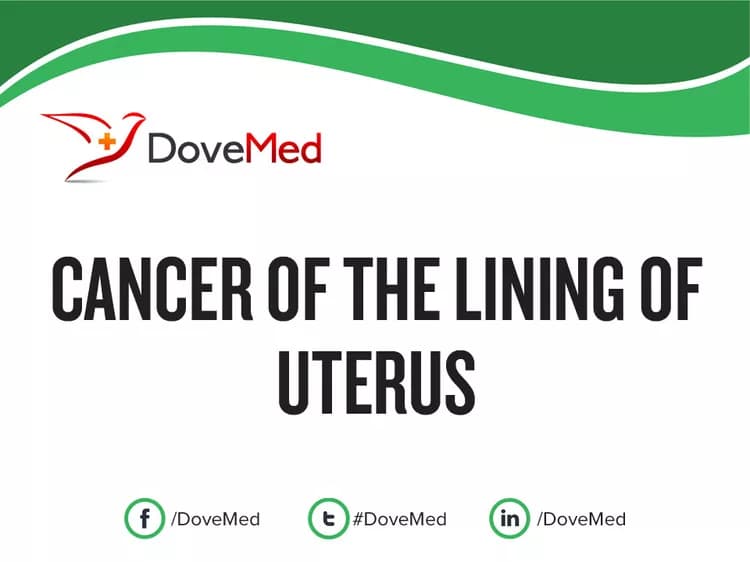The topic Cancer of the Lining of Uterus you are seeking is a synonym, or alternative name, or is closely related to the medical condition Endometrial Cancer.
Quick Summary:
- Cancers of the uterus can arise from various structures of the uterus. Broadly, they may be categorized as the following:
- Carcinoma of the endometrium (arising from the lining of the endometrium)
- Carcinoma arising in the wall of the uterus (called sarcomas)
- Carcinoma arising from the outside covering of the uterus (serosal surface of the uterus): Such cancers arising from the serosal surface are very rare and are called sarcomas
- Endometrial Cancer is a type of cancer that begins in the lining of the uterus (the endometrium). The majority of Endometrial Cancer cases are detected and diagnosed in women aged 50 years and older (80% of the tumors are observed in postmenopausal women)
- According to the World Cancer Research Fund International (WCRF International), Endometrial Cancer is the 6th most commonly diagnosed cancer in women. Also, each year, approximately around 350,000 new cases are diagnosed in women worldwide
- A variety of factors are known to influence the development of the cancer including endometrial hyperplasia, poorly-controlled diabetes, positive family history, and polycystic ovarian syndrome. Obese women have an elevated risk of developing Endometrial Cancer. The exact cause of the cancer is unknown, but it may be due to certain genetic abnormalities
- The majority of Endometrial Cancer cases are detected and diagnosed at an early stage due to frequent abnormal vaginal bleeding, which is a major indicative sign. Additional signs and symptoms may include pelvic pain, pain during sex, and urination difficulties
- If Endometrial Cancer is diagnosed early, then a surgical removal of the uterus (where possible) usually eliminates the cancer. The earlier the stage of cancer at detection and the lower the grade of the cancer, the better is the prognosis
There are many different types of Endometrial Cancer. The type of normal uterus cells that transform to malignancy can help identify the subtype of Endometrial Cancer, which in turn can help determine the appropriate treatment to be provided. Some of the different types include:
- Endometrioid Carcinoma of Endometrium
- Mucinous Carcinoma of Endometrium
- Serous Carcinoma of Endometrium
- Clear Cell Carcinoma of Endometrium
- Neuroendocrine Tumors of Endometrium
- Mixed Carcinomas of Endometrium
- Undifferentiated and Dedifferentiated Carcinomas of the Endometrium
Based on the FIGO grading system, Endometrial Cancer types are histologically graded as the following:
- FIGO 1: Low-grade
- FIGO 2: Low-grade
- FIGO 3: High-grade
[FIGO - International Federation of Gynecology and Obstetrics]
Based on the grading, whether the tumor is influenced by excess estrogen, the type of genetic mutations noted, and other prognostic factors, Endometrial Cancer types are categorized as the following:
- Type 1 Endometrial Cancers:
- Includes endometrioid carcinoma and mucinous carcinoma
- The tumors are low-grade (FIGO 1 and 2)
- These categories of tumors are influenced by excessive estrogen stimulation, tamoxifen use, obesity, polycystic ovary syndrome, and other factors
- The presence of endometrial intraepithelial neoplasm (EIN) or atypical endometrioid hyperplasia is a significant risk factor
- Type 1 tumors are found to have mutations in PTEN, KRAS, and PAX2 genes
- Type 2 Endometrial Cancers:
- Includes serous carcinoma, clear cell carcinoma, carcinosarcoma, and undifferentiated carcinoma
- These are high-grade tumors (FIGO 3) that are aggressive in nature. In most cases at the time of diagnosis, the tumors are found to be in advanced (metastatic) stages
- Unopposed estrogen exposure is less of a risk factor, when compared to type 1 cancers
Please find comprehensive information on Endometrial Cancer regarding definition, distribution, risk factors, causes, signs & symptoms, diagnosis, complications, treatment, prevention, prognosis, and additional useful information HERE.
Related Articles
Test Your Knowledge
Asked by users
Related Centers
Related Specialties
Related Physicians
Related Procedures
Related Resources
Join DoveHubs
and connect with fellow professionals


0 Comments
Please log in to post a comment.